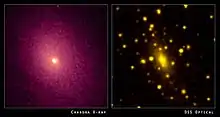Abell 2029
Abell 2029 or A2029 is a large and relaxed cluster of galaxies 315 megaparsecs (1.027 billion light-years) away in the constellation Virgo.[5] A2029 is a Bautz–Morgan classification type I cluster due to its large central galaxy, IC 1101. Abell 2029 has a diameter of 5.8–8 million light-years. This type of galaxy is called a cD-type brightest cluster galaxy and may have grown to its large size by accreting nearby galaxies. Despite its relaxed state, it is the central member of a large supercluster which shows clear signs of interaction.
| Abell 2029 | |
|---|---|
 | |
| Observation data (Epoch J2000) | |
| Constellation(s) | Virgo |
| Right ascension | 15h 10m 56.20s |
| Declination | +05° 44′ 41″ |
| Brightest member | IC 1101 |
| Richness class | 2[1] |
| Bautz–Morgan classification | I [1] |
| Redshift | 0.0767[2] |
| Distance | 326 Mpc (1,063×106 ly) h−1 0.705 [3] |
| ICM temperature | 8.47 keV[4] |
| Binding mass | 8×1014[2][4] M☉ |
| X-ray flux | 6.94×10−11 erg s−1 cm−2 (0.1–2.4 keV)[3] |
References
- Abell, George O.; Corwin, Harold G., Jr.; Olowin, Ronald P. (May 1989). "A catalog of rich clusters of galaxies". Astrophysical Journal Supplement Series. 70 (May 1989): 1–138. Bibcode:1989ApJS...70....1A. doi:10.1086/191333. ISSN 0067-0049.
{{cite journal}}: CS1 maint: multiple names: authors list (link) - Walker, S. A.; Fabian, A. C.; Sanders, J. S.; George, M. R.; Tawara, Y. (March 2012). "X-ray observations of the galaxy cluster Abell 2029 to the virial radius". Monthly Notices of the Royal Astronomical Society. 422 (4): 3503–3515. arXiv:1203.0486. Bibcode:2012MNRAS.422.3503W. doi:10.1111/j.1365-2966.2012.20860.x. S2CID 118676311.
- NASA/IPAC EXTRAGALACTIC DATABASE. "NED results for object ABELL 2029". Retrieved March 11, 2012.
- Table 4 from Vikhlinin, A.; Kravtsov, A.; Forman, W.; Jones, C.; Markevitch, M.; Murray, S. S.; Van Speybroeck, L. (April 2006). "Chandra Sample of Nearby Relaxed Galaxy Clusters: Mass, Gas Fraction, and Mass-Temperature Relation". The Astrophysical Journal. Chicago, Illinois, USA. 640 (2): 691–709. arXiv:astro-ph/0507092. Bibcode:2006ApJ...640..691V. doi:10.1086/500288. S2CID 18940822.
- Chandra X-ray Observatory, "Galaxy Clusters and Dark Energy: Chandra Opens New Line of Investigation on Dark Energy", Harvard-Smithsonian Center for Astrophysics
External links
- Abell 2029 on WikiSky: DSS2, SDSS, GALEX, IRAS, Hydrogen α, X-Ray, Astrophoto, Sky Map, Articles and images
- The Scale of the Universe (Astronomy Picture of the Day 2012 March 12)
This article is issued from Wikipedia. The text is licensed under Creative Commons - Attribution - Sharealike. Additional terms may apply for the media files.